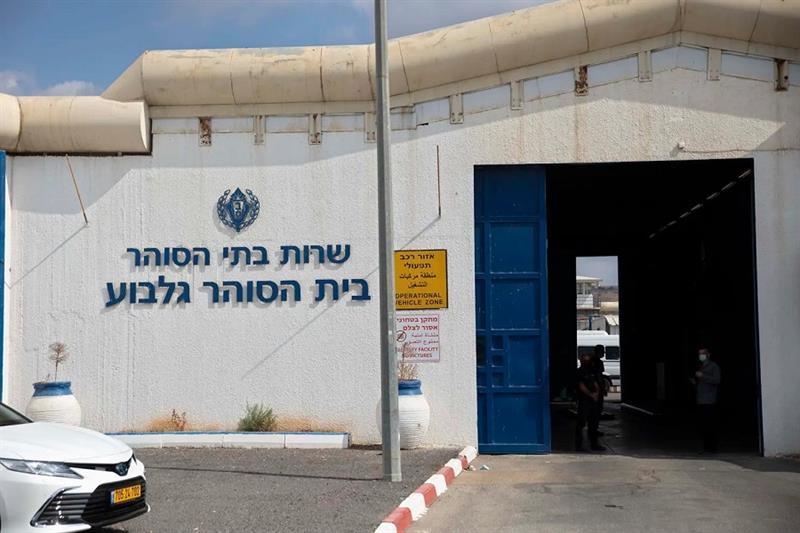
In this file photo prison officers stand guard at the entrance of the high-security Gilboa prison in northern Israel. - Gilboa prison is the site of a scandal that saw 6 Palestinian inmates escape on 6 September 2021 through a tunnel they dug from their cell sparking a massive manhunt over several days. The escapees were eventually detained and indicted for escaping from lawful custody. AP
Khalil Awawdeh has refused food for just over 160 days according to this family in a bid to draw attention to his detention by Israel without trial or charge. His case was thrust into the spotlight after a flare-up of violence last weekend between Israel and Gaza militants, who demanded that he be released as part of a cease-fire that ended the fighting. The death toll in the violence has since risen to 47.
The 40-year-old father of four was arrested by Israel in December, accused of being a member of a militant group, a charge Awawdeh's lawyer said he denies. Recently, he has been using a wheelchair and was showing memory loss and speech difficulties, according to his lawyer, Ahlam Haddad.
Dalal Awawdeh, Khalil's wife, said his condition had deteriorated, prompting Israeli authorities to move him to a hospital. The Palestinian Prisoners Club, which represents former and current prisoners, confirmed that Awawdeh's condition had worsened.
"He is in a real life-threatening situation,'' said Qadura Fares, the head of the organization. "He could die at any moment.''
An Israeli prison service official confirmed that Awawdeh had been moved to a hospital Thursday. The official spoke on condition of anonymity because of the sensitive nature of Awawdeh's detention.
Prospects for Awawdeh's release under the cease-fire are uncertain. But his case highlights the plight of hundreds of Palestinians who are being held by Israel under a system that critics say denies them the right to due process, known as administrative detention. The worsening conditions of hunger striking prisoners has in the past whipped up tensions with the Palestinians, and in some cases prompted Israel to accede to hunger strikers' demands.
Israel is currently holding some 4,400 Palestinians, including militants who have carried out deadly attacks, as well as people arrested at protests or for throwing stones. Around 670 Palestinians are now being held in administrative detention, a number that jumped in March as Israel began near-nightly arrest raids in the West Bank following a spate of deadly attacks against Israelis.
Israel says administrative detention is needed to prevent attacks or to keep dangerous suspects locked up without sharing evidence that could endanger valuable intelligence sources. Israel says it provides due process and largely imprisons those who threaten its security, though a small number are held for petty crimes.
Palestinians and human rights groups say the system is designed to quash opposition and maintain permanent control over millions of Palestinians while denying them basic rights.
Meanwhile, the death toll from last weekend's fighting between Israel and Gaza militants rose to 47, after a man died from wounds sustained during the violence, the Health Ministry in Gaza said Thursday.
Israeli aircraft struck targets in the Gaza Strip and the Palestinian Islamic Jihad militant group fired more than a thousand rockets over three days of fighting, the worst cross-border violence since an 11-day war with Hamas last year.
According to the Health Ministry, 47 people were killed, among them 16 children and four women. Israeli strikes appear to have killed some 30 people, among them several militants and two senior Islamic Jihad commanders, one of whom Israel said it targeted in order to foil an imminent attack. As many as 16 people might have been killed by rockets misfired by Palestinian militants.
It wasn't immediately clear how the man whose death was announced Thursday was wounded.
The cease-fire took hold Sunday night, bringing an end to the fighting, in which no Israelis were killed or seriously wounded.
Israel and Gaza's militant Hamas rulers have fought four wars and several smaller battles over the last 15 years at a staggering cost to the territory's 2 million Palestinian residents.
Short link: